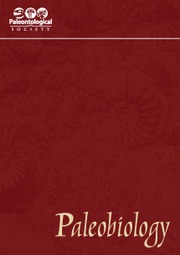Crossref Citations
This article has been cited by the following publications. This list is generated based on data provided by
Crossref.
Simpson, Carl
and
Kiessling, Wolfgang
2010.
The role of extinction in large-scale diversity–stability relationships.
Proceedings of the Royal Society B: Biological Sciences,
Vol. 277,
Issue. 1686,
p.
1451.
Simpson, Carl
2010.
Species selection and driven mechanisms jointly generate a large-scale morphological trend in monobathrid crinoids.
Paleobiology,
Vol. 36,
Issue. 3,
p.
481.
Payne, Jonathan L.
Truebe, Sarah
Nützel, Alexander
and
Chang, Ellen T.
2011.
Local and global abundance associated with extinction risk in late Paleozoic and early Mesozoic gastropods.
Paleobiology,
Vol. 37,
Issue. 4,
p.
616.
Harnik, Paul G.
2011.
Direct and indirect effects of biological factors on extinction risk in fossil bivalves.
Proceedings of the National Academy of Sciences,
Vol. 108,
Issue. 33,
p.
13594.
Powell, Matthew G.
and
MacGregor, Johnryan
2011.
A geographic test of species selection using planktonic foraminifera during the Cretaceous/Paleogene mass extinction.
Paleobiology,
Vol. 37,
Issue. 3,
p.
426.
Simpson, Carl
Kiessling, Wolfgang
Mewis, Heike
Baron-Szabo, Rosemarie C.
and
Müller, Johannes
2011.
EVOLUTIONARY DIVERSIFICATION OF REEF CORALS: A COMPARISON OF THE MOLECULAR AND FOSSIL RECORDS.
Evolution,
Vol. 65,
Issue. 11,
p.
3274.
Simpson, Carl
and
Müller, Johannes
2012.
From Clone to Bone.
p.
116.
Harnik, Paul G.
Simpson, Carl
and
Payne, Jonathan L.
2012.
Long-term differences in extinction risk among the seven forms of rarity.
Proceedings of the Royal Society B: Biological Sciences,
Vol. 279,
Issue. 1749,
p.
4969.
Cascales-Miñana, Borja
2012.
Disentangling temporal patterns in our perception of the fossil history of gymnosperms.
Historical Biology,
Vol. 24,
Issue. 2,
p.
143.
Ros, Sonia
and
Echevarría, Javier
2012.
Ecological signature of the end-Triassic biotic crisis: what do bivalves have to say?.
Historical Biology,
Vol. 24,
Issue. 5,
p.
489.
Zaffos, Andrew
and
Holland, Steven M.
2012.
Abundance and extinction in Ordovician–Silurian brachiopods, Cincinnati Arch, Ohio and Kentucky.
Paleobiology,
Vol. 38,
Issue. 2,
p.
278.
Korn, Dieter
Hopkins, Melanie J.
and
Walton, Sonny A.
2013.
EXTINCTION SPACE-A METHOD FOR THE QUANTIFICATION AND CLASSIFICATION OF CHANGES IN MORPHOSPACE ACROSS EXTINCTION BOUNDARIES.
Evolution,
p.
n/a.
Simpson, Carl
2013.
SPECIES SELECTION AND THE MACROEVOLUTION OF CORAL COLONIALITY AND PHOTOSYMBIOSIS.
Evolution,
Vol. 67,
Issue. 6,
p.
1607.
Foote, Michael
and
Miller, Arnold I.
2013.
Determinants of early survival in marine animal genera.
Paleobiology,
Vol. 39,
Issue. 2,
p.
171.
Hopkins, Melanie J.
2014.
The environmental structure of trilobite morphological disparity.
Paleobiology,
Vol. 40,
Issue. 3,
p.
352.
Alroy, John
2014.
Accurate and precise estimates of origination and extinction rates.
Paleobiology,
Vol. 40,
Issue. 3,
p.
374.
Aberhan, Martin
Kiessling, Wolfgang
and
Colgan, Donald J.
2014.
Rebuilding Biodiversity of Patagonian Marine Molluscs after the End-Cretaceous Mass Extinction.
PLoS ONE,
Vol. 9,
Issue. 7,
p.
e102629.
Harnik, Paul G.
Fitzgerald, Paul C.
Payne, Jonathan L.
and
Carlson, Sandra J.
2014.
Phylogenetic signal in extinction selectivity in Devonian terebratulide brachiopods.
Paleobiology,
Vol. 40,
Issue. 4,
p.
675.
Pennell, Matthew W.
Harmon, Luke J.
and
Uyeda, Josef C.
2014.
Is there room for punctuated equilibrium in macroevolution?.
Trends in Ecology & Evolution,
Vol. 29,
Issue. 1,
p.
23.
Hopkins, Melanie J
Simpson, Carl
Kiessling, Wolfgang
and
Wiens, John
2014.
Differential niche dynamics among major marine invertebrate clades.
Ecology Letters,
Vol. 17,
Issue. 3,
p.
314.


